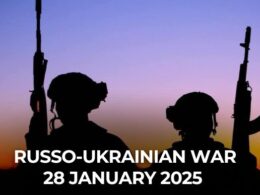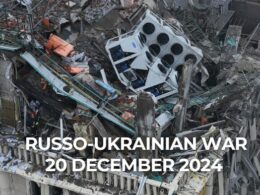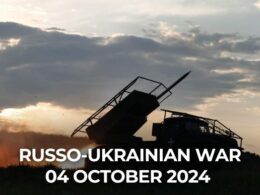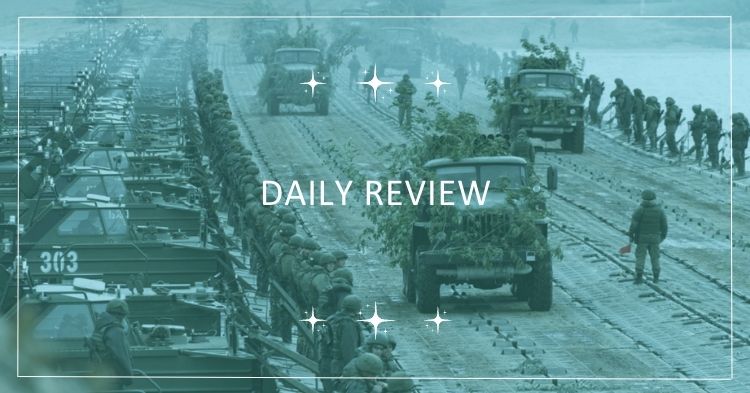Past 24 hours in the war zone
- On 20 January, Russian-hybrid forces launched 5 attacks on Ukrainian positions in Donetsk, Luhansk, and Mariupol sectors, including heavy artillery and weapons banned by Minsk, according to Ukraine's Joint Forces Operation Command.
- As of 19:30 Jan 19, OSCE's Special Monitoring Mission recorded 68 ceasefire violations in Donetsk Oblast, including eight explosions, and 15 violations in Luhansk Oblast with one explosion among them.
Ukraine news flash
- Russia is expecting a written US response on “security guarantees," says Russian presidential spokesperson Dmitry Peskov, and reiterates Russia's MFA.
- Poland's prime minister Andrzej Duda on 21 January called on European leaders to take a tough, united stance towards Russia amid fears that Moscow could be readying an invasion of Ukraine.
- Canada will offer Ukraine a loan of up to C$120 million ($95.6 million) and is looking at other ways to support Kyiv as a crisis with Russia deepens, Prime Minister Justin Trudeau said on 21 January.
- Russian lawmakers will start discussions next week on an initiative for possibly recognizing the so-called Luhansk and Donetsk "people's republics" as independent states.
Blinken and Lavrov meet in Geneva
US Secretary of State Antony Blinken and Russian Foreign Minister Sergei Lavrov met for talks in Geneva amid mounting fears that Russia could be about to invade Ukraine, which Russia denies. Russia has bolstered its military buildup on Ukraine's border up to at least 100,000 troops while engaging in weeks of diplomatic talks with the West.
The face-to-face meeting lasted for 90 minutes. Before his sitdown with Lavrov, Blinken said that the US didn't expect any major breakthroughs, and those predictable didn't happen.
Antony Blinken explained what the United States would consider an invasion,
“We’ve been clear – if any Russian military forces move across Ukraine’s border, that’s a renewed invasion. It will be met with swift, severe and a united response from the United States and our partners and allies,” he said after the meeting.
Meanwhile, the Russian Foreign Ministry commented on the meeting in the following way,
"It was made clear to Antony Blinken that further ignoring Russia’s legal concerns, first of all, those linked with the United States’ and its NATO allies’ advance in Ukraine amid the large-scale deployment of the alliance’s forces and weapons near our border, will have the most serious consequences."
Additionally, the Russian MFA said that those "most serious consequences" can be avoided if
"...Washington positively responds to our draft agreements on security guarantees. We expect to receive the American side’s written article-by-article response next week."
The US State Secretary said that the US will share the concerns and ideas with Russia in writing next week after the consultations with allies and partners.
"And we agreed to further discussions after that," Antony Blinken added.
The fact that both sides promised to keep the dialog going is probably the only positive outcome of this meeting.
Germany blocks NATO ally from sending weapons to Ukraine, again
Germany is blocking North Atlantic Treaty Organization ally Estonia from giving military support to Ukraine by refusing to issue permits for German-origin weapons to be exported to Kyiv as it braces for a potential Russian invasion.
Earlier, in November 2021, Berlin vetoed Ukraine’s purchase of anti-drone rifles and anti-sniper systems through a NATO procurement agency from Lithuania.
Britain reportedly sent 2,000 anti-tank weapons to Ukraine earlier this week
The Daily Mail first reported that the UK had sent 2,000 anti-tank missile launchers in the airlifts to Ukraine at the beginning of this week. A group of around 30 elite British troops arrived in Ukraine to help train the Ukrainian armed forces on new anti-tank weapons gifted by Britain.
The UK is understood to have gifted the Next Generation Light Anti-Tank Weapon, (NLAW), which is described by its manufacturers as "the first-ever single soldier missile system that rapidly knocks out any Main Battle Tank in just one shot by striking it from above".
Czechia to send artillery shells to Ukraine
The Czech Ministry of Defense seeks to support Ukraine by providing artillery munitions to the Ukrainian Armed Forces, according to Czech media. A spokesperson for the Czech Defense Ministry said that the agency, in agreement with Chief of General Staff Ales Opata, would file with the government a motion to provide assistance to Ukraine on 26 January. The plan is to hand over artillery munitions. The report came after the statement of the Czech Republic's Defense Minister Jana Černochová, in which she reaffirmed the government's readiness to supply Ukraine with military materiel.
The Netherlands might supply weapons to Ukraine
Dutch Foreign Affairs Minister Wopke Hoekstra has told the country's MPs that the Netherlands will "look sympathetically" at the request if Ukraine asks for help with the supply of defensive weapons, according to DutchNews.nl.
He reportedly also said that his country is also working on creating a team of cyber experts to help Ukraine fight cyberattacks, and is making two F-35 fighter jets available to the NATO quick reaction force, which will be based in Bulgaria.
Baltic states confirm they will send weapons to Ukraine
Following reports that the US has cleared Britain and the Baltic states to send US-made weapons to Ukraine, Latvia's Defense Minister Artis Pabriks has confirmed Lativa, Lithuania, and Estonia will indeed send arms to Ukraine.
"The Baltic states will send “Stinger” and “Javelin” systems, as well as various individual equipment to help Ukraine to strengthen its defences. I strongly urge Russia to de-escalate situation at the border with Ukraine and respect its sovereignty," he tweeted.
US clears Baltic States, Britain to send American-made weapons to Ukraine: media
Tweet of the day
Speaking in Australia, UK Foreign Secretary Liz Truss outlined the formation of a new "Trilateral" between the UK, Poland, and Ukraine.
This comes on the heels of UK's dispatches of anti-tank weapons that in the course of 48 hours have exceeded the entire amount of such weapons from all NATO countries since 2014, combined.
Poland is mulling military assistance while calling for a united European stance for Ukraine while the Baltics have confirmed they will send US-made Javelins and Stingers, too. Canada, Czechia, the Netherlands are considering sending arms as well. 
Russia now wants NATO out of Bulgaria, Romania, and 12 other countries
The Russian Ministry of Foreign Affairs has confirmed its absurd demands that NATO leave Bulgaria and Romania, implying that all NATO members who joined the Alliance after 1997 shouldn’t be in NATO. These include a total of 14 states — former Warsaw Bloc countries with several former Soviet and Yugoslavian republics.
Russia now wants NATO out of Bulgaria, Romania, and 12 other countries
Territorial Defense Forces of Ukraine to carry out at least five brigade exercises
Ukraine's Territorial Defense Forces together with other units of the Armed Forces are going to conduct at least five military drills at a brigade level involving mobilized reservists, according to the Forces' commander Yuriy Halushkin.
The force would train commanders and leaders of smaller units, communication operatives, mortar crews, anti-tankers, anti-aircraft gunners.
Russia moving “significant parts” of its far-eastern military units towards Ukraine: digital sleuths
Radio Liberty together with the Conflict Intelligence Team of digital sleuths have analyzed comments under the videos of Russian military equipment on move by rail towards Ukrainian borders.
They also talked to some commenters privately, some of those appeared to be the Russian soldiers or their loved ones. Corroborated by previously known facts, the data acquired in this way showed that Russia transfers large parts of military units for a several-month-long stay near the Ukrainian border in Belarus or Western Russia. Troops include units necessary in large-scale operations, some of which fought against Ukraine in 2014-2015.
Russia moving “significant parts” of its far-eastern military units towards Ukraine: digital sleuths
‘Everyone will lose’ if Russia invades Ukraine: Zelenskyy's interview with WP
“If we are going to protect ourselves against one of the most powerful armies in the world, then this will be war,” Ukrainian President Volodymyr Zelenskyy says in a new interview with The Washington Post, “If this will be war, it’s going to be a very strong war, and everyone will lose. Hundreds of thousands of lives will be lost.”
"Don’t believe Putin’s propaganda. Sanctions are hurting Russia."
The Putin regime has long sought to convince Russians that international sanctions imposed over the invasion of Ukraine are actually beneficial for the country. Russia’s propaganda machine has also succeeded in persuading many Western analysts that sanctions measures have been a failure. However, a range of Russian sources tell a different story and reveal the broad extent of the impact, Harley Balzer writes on Atlantic Council.
Spain's Foreign Minister Says Europeans 'United' on Ukraine Crisis
Spain's foreign minister Jose Manuel Albares said on 21 January that Europeans have a united position on the crisis over the Russian military build-up on the Ukrainian border and that Spain is pushing for dialog.
The next phase of the Hybrid War, or why Russia is unlikely to invade Ukraine
The question on everyone’s minds is “Will Russia invade Ukraine?” Military analyst Hans Petter Midttun argues a full-scale invasion is extremely unlikely — but another form of intervention is.
The next phase of the Hybrid War, or why Russia is unlikely to invade Ukraine
73 East Europe experts call on Germany to “fundamentally correct” Russia policy
As fears of an escalation of Russia’s military aggression against Ukraine grow, 73 East Europe and security experts are calling on Germany for a fundamental correction of its policy on Russia.
73 East Europe experts call on Germany to “fundamentally correct” Russia policy





